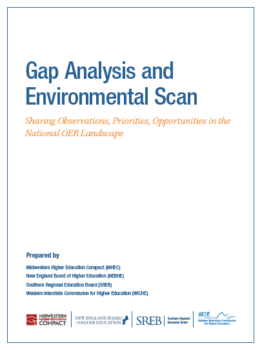Higher Education Compacts Come Together to Help Students Succeed with Open Educational Resources
December 11, 2020
State leaders, postsecondary education institutions, and education leaders are working across state lines to promote the adoption of open educational resources (OER) to help millions of students access high-quality learning materials that are free to use, customize, and share. OER are free for students, and they make it easy for faculty to personalize lessons and textbooks to engage students with fresh, relevant content.
With renewed support from the William and Flora Hewlett Foundation, the four regional higher education compacts—the Midwestern Higher Education Compact (MHEC), the New England Board of Higher Education (NEBHE), the Southern Regional Education Board (SREB), and the Western Interstate Commission for Higher Education (WICHE)—will coordinate in a joint effort to provide policy leaders, institutional leaders, and researchers and practitioners with research and tools to support the use of these openly-licensed materials.
The four compacts—representing 47 states, two territories, and six affiliates—will leverage their long-standing networks of policymakers (governors, legislators, community leaders, and higher education leaders) to identify and implement strategies that can scale and amplify the benefits of OER within states and institutions. Specific OER solutions may vary by state, and the compacts will work with each state to find ways to scale and sustain OER opportunities across their colleges and universities.

“In the midst of COVID-19 and the economic recession, it’s imperative that we do all we can to raise awareness about OER and eliminate one of the most widely shared cost and access barriers for students,” said Tanya Spilovoy, director of open policy at WCET (WICHE Cooperative for Educational Technologies). “The recent report I co-authored with Jeff Seaman and Nate Ralph of Bay View Analytics, “The Impact of OER Initiatives on Faculty Selection of Classroom Materials,” shows that initiatives supporting OER increase the number of faculty using open resources in their classrooms.”
Activities to increase OER adoption will be conducted within each compact as well as collaboratively across all compacts. Each compact will coordinate at least onefocus area with targeted activities and deliverables to support their own region and that can also be adapted by other regions, individual institutions, and states. At the collaborative level, WCET will assist with activities that engage two or more compacts and coordinate activities with national impact, including technical assistance, hosting webinars and other convenings, developing policy briefs, sharing lessons learned across states, conducting group and one-on-one interviews, conducting and supporting rigorous research, and promoting common return-on-investment measures.
There is strong support for OER from each compact as evidenced by the following statements:
Midwestern Higher Education Compact President Susan Heegaard
“We are grateful to the Hewlett Foundation for their ongoing support of OER work at MHEC and in the Midwest. These funds build upon the funding they provided for our regional OER Implementation Summit in 2018, and the 2019 Senior Leaders Open Education Seminar we collaborated on with the Open Education Network. The additional 18-months of financial support will allow our state OER action teams to continue to build OER communities of practice and the capacity to put their state plans into action with the goal of increased innovation, access, and improved student learning.”
Southern Regional Education Board President Stephen L. Pruitt
“Open educational resources hold great promise for improving equity by bringing high-quality programs to more students. Making dual enrollment more affordable and available, for example, can make a big difference in the education trajectory of students from low-income families or small, rural schools.”
Western Interstate Commission for Higher Education President Demarée Michelau
“Our collaborative approach working with higher education leaders in the West and the regional compacts to improve educational outcomes by removing a significant cost barrier via OER is unprecedented. Especially during a time when states, campuses, and students are all facing significant financial pressures, we need an effective strategy, like OER, that can be implemented and scaled that eases cost pressures, strengthens educational opportunities, and promotes equitable outcomes for students.”
New England Board of Higher Education President and CEO Michael K. Thomas
“OER removes a core barrier to student success—the cost of textbooks—and enables faculty to provide more authentic, equitable and culturally relevant teaching and learning experiences. NEBHE is grateful to the Hewlett Foundation for its support as we engage with our colleagues to bring these best practices to light at such a crucial moment.”
 New Publication
New Publication
Gap Analysis and Environmental Scan:
Sharing Observations, Priorities, Opportunities in the National OER Landscape
December 2020
The four regional education compacts—the Midwestern Higher Education Compact, the New England Board of Higher Education, the Southern Regional Education Board, and the Western Interstate Commission for Higher Education—are working together to help scale the adoption and use of open education resources nationally to allow millions students access to free, high-quality learning resources.
